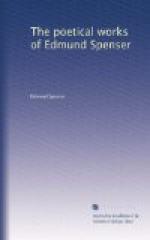Hard by a rivers side a virgin faire,
Folding her armes to heaven with thousand throbs,
And outraging her cheekes and golden haire,
To falling rivers sound thus tun’d her sobs.
“Where is,” quoth she, “this whilom
honoured face?
Where the great glorie and the auncient praise,
In which all worlds felicitie had place,
When gods and men my honour up did raise?
Suffisd’ it not that civill warres me made
The whole worlds spoile, but that this Hydra new,
Of hundred Hercules to be assaide,
With seven heads, budding monstrous crimes anew,
So many Neroes and Caligulaes
Out of these crooked shores must dayly
rayse?”
XI.
Upon an hill a bright flame I did see,
Waving aloft with triple point to skie,
Which, like incense of precious cedar tree,
With balmie odours fil’d th’ayre farre
and nie.
A bird all white, well feathered on each wing,
Hereout up to the throne of gods did flie,
And all the way most pleasant notes did sing,
Whilst in the smoake she unto heaven did stie*.
Of this faire fire the scattered rayes forth threw
On everie side a thousand shining beames:
When sudden dropping of a silver dew
(O grievous chance!) gan quench those precious flames;
That it, which earst** so pleasant sent
did yeld,
Of nothing now but noyous sulphure smeld.
[* Stie, mount.]
[** Earst, at first.]
XII.
I saw a spring out of a rocke forth rayle*,
As cleare as christall gainst the sunnie beames;
The bottome yeallow, like the golden grayle*
That bright Pactolus washeth with his streames.
It seem’d that Art and Nature had assembled
All pleasure there for which mans hart could long;
And there a noyse alluring sleepe soft trembled,
Of manie accords, more sweete than mermaids song,
The seates and benches shone as yvorie,
And hundred nymphes sate side by side about;
When from nigh hills, with hideous outcrie,
A troupe of satyres in the place did rout,@
Which with their villeine feete the streame did ray,$
Threw down the seats, and drove the nymphs away.
[* Rayle, flow.]
[** Grayle, gravel.]
[@ Rout, burst.]
[$ Ray, defile.]
XIII.
Much richer then that vessell seem’d to bee
Which did to that sad Florentine appeare,
Casting mine eyes farre off, I chaunst to see
Upon the Latine coast herselfe to reare.
But suddenly arose a tempest great,
Bearing close envie to these riches rare,
Which gan assaile this ship with dreadfull threat,
This ship, to which none other might compare:
And finally the storme impetuous
Sunke up these riches, second unto none,
Within the gulfe of greedie Nereus.
I saw both ship and mariners each one,
And all that treasure, drowned in the
maine:
But I the ship saw after raisd’
againe.
[XIII. 1.—That vessell. See
the second canto of the Purgatorio. C.]




